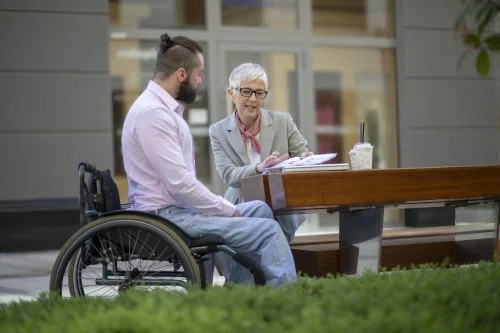
Crashes caused by intoxicated drivers are nothing new — drunk driving has been a serious public health concern for decades and continues to take thousands of lives each year. In fact, drivers impaired by alcohol were responsible for 30% of all U.S. deaths caused by traffic-related incidents in 2020.
On top of this, many more accidents are caused by individuals driving while under the influence of drugs that affect the central nervous system (whether illegal or prescribed) or driving while overly tired (“drowsy driving”). All of these are considered impaired driving and pose a danger to the driver as well as other motorists and pedestrians.
When you’re in any motor vehicle accident, you may be unsure where to turn next or what legal options you have at your disposal. Though no one ever expects to be in such an accident when they get on the road, we cannot predict the irresponsible actions of other drivers. Therefore, it is our hope that this step-by-step guide will prepare you and protect your rights if you are ever in a collision with an impaired driver.
Step One: Contacting Emergency Services
The first step after being hit by an impaired driver in Indiana is to contact local emergency services.
Call 911 immediately in any accident where someone is injured, even if you are unsure about the severity of the injuries. If you are able to communicate with the other driver and everyone appears to be fine, you may choose to call the non-emergency police. However, if you or your passengers are injured, or if you are unsure about the other driver’s condition, the best practice is to go ahead and call 911.
Getting law enforcement involved will ensure that a police report is filed and that the impaired driver can be tested for intoxication by a third party. This documentation will be necessary evidence for your eventual claim. Additionally, you will have the opportunity to be seen by EMTs who can tend to any injuries.
Step Two: Being Evaluated for Injuries
If you have called 911, EMTs will likely arrive on the scene promptly and provide necessary medical attention. Even if you don’t think you’ve suffered any serious harm, allow yourself to be evaluated by medical professionals and follow any advice or treatment plan given.
It’s worth noting that some injuries may not become apparent until later on, so if you notice symptoms of internal injuries, such as abdominal pain, headaches, dizziness, or back and neck pain in the coming days, it is crucial to see your doctor as soon as possible.
Following this step can help protect your health and, later on, your settlement as it provides a clear paper trail of your injuries related to the crash.
Step Three: Exchanging and Collecting Information
Information you will need to exchange with the other driver includes insurance information, driver’s license numbers, and contact information. Go ahead and take note of the make, model, and license plate number of the other driver’s car as well.
If there were any witnesses to the accident, it’s also a good idea to get their contact information as eyewitness testimony can be very helpful when it comes to determining fault and proving your case.
Remember: remain calm and collected when exchanging information with the other driver. Never apologize or admit fault as this can escalate the situation and make it harder to reach a fair resolution, even if you were just being polite.
Step Four: Reporting the Accident to Your Insurance Company
The next step is to report the accident to your insurance company. It’s best to do this as soon as possible after the accident, as some policies have a time limit for reporting accidents.
Be sure to report only the facts of the accident and nothing more. If the insurance adjuster asks you to provide a recorded statement or to sign an agreement of any sort, it will be in your best interest to decline.
By reporting the accident promptly and providing accurate information, you are ensuring that the claims process is able to go smoothly and that you will be able to receive any compensation you are legally owed.
Step Five: Consulting With a Lawyer Before Moving Forward
After reporting the accident to your insurance company, you should speak with an attorney before taking any further steps. An auto accident attorney can help you pursue an injury claim against the drunk or otherwise impaired driver who caused the accident, and they can be sure that you are not accidentally jeopardizing your claim by falling for the insurance company’s sneaky tactics.
Every driver has a duty to act reasonably to protect others on the road. When you are hit by a drunk, drugged, or drowsy driver, that individual has violated their duty to you, and they are responsible for any damages caused by the accident.
However, even if the driver is charged with and convicted of impaired driving, you must still prove that the driver caused the collision that resulted in your injury to receive compensation. Simply showing the driver was intoxicated or fatigued is not enough to prove fault. For this reason, the other driver’s insurance company will usually attempt to deny your injury claim in order to avoid paying a large settlement.
Hiring an experienced car accident attorney is extremely important in this situation. They will have the skills, resources, and knowledge to conduct a thorough accident investigation and obtain the evidence needed to prove fault. Never assume an injury claim is cut and dried just because a drunk driver is involved. Insurance companies fight DUI accident claims as aggressively as they fight other injury claims.
Step Six: Pursuing Damages From the Impaired Driver
After an attorney has evaluated your unique situation and determined that you have a valid case for compensation, it is time to begin working to recover your losses.
When pursuing damages, you’ll want to work closely with your attorney to build a strong case. Indiana law imposes a two-year statute of limitations on personal injury claims arising from car accidents, so you’ll have two years from the date of the accident to file a lawsuit. If you wait too long to contact a lawyer and begin your claim, you forfeit your right to seek any damages from the impaired driver.
Though every case will be different, some of the damages you can expect to recover are property damage (to your vehicle or other possessions), medical bills, lost wages (for both the past and future), and pain and suffering (both emotional and physical). You may also be entitled to compensation for permanent disability, scarring, or disfigurement, and if the accident resulted in wrongful death, cremation, funeral, and burial expenses may be accounted for.
Your attorney will work alongside you to determine the full extent of your losses and help you recover every penny.
For a free consultation with an Indiana car wreck attorney, call 1-800-CALL-KEN or speak with one of our representatives online. We are here for you 24/7 to schedule a free consultation and case evaluation.
Money cannot undo the damage done by a drunk driver, but a financial settlement can help pay for your medical treatment and other accident-related needs to take the financial burden off of you and your family.









